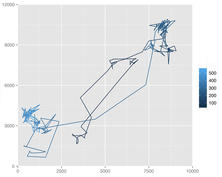Publication trimestrielle du Laboratoire
d'analyse et d'architecture des systèmes du CNRS
Understanding and predicting structure-function relationships in proteins with fully in silico approaches remain today a great challenge. Despite recent developments of computational methods for studying molecular motions and interactions, dealing with macromolecular flexibility largely remains out of reach of the existing molecular modeling tools. The aim of this thesis is to develop a novel approach based on motion planning algorithms originating from robotics to better deal with macromolecular flexibility in protein interaction studies.We have extended a recent sampling-based algorithm, ML-RRT, for (dis)-assembly path planning of complex articulated objects. This algorithm is based on a partition of the configuration parameters into active and passive subsets, which are then treated in a decoupled manner. The presented extensions permit to consider different levels of mobility for the passive parts that can be pushed or pulled by the motion of active parts. This algorithmic tool is successfully applied to study protein conformational changes induced by the diffusion of a ligand inside it.Building on the extension of ML-RRT, we have developed a novel method for simultaneously (dis)assembly sequencing and path planning. The new method, called Iterative-ML-RRT, computes not only the paths for extracting all the parts from a complex assembled object, but also the preferred order that the disassembly process has to follow. We have applied this general approach for studying disassembly pathways of macromolecular complexes considering a scoring function based on the interaction energy. The results described in this thesis prove not only the efficacy but also the generality of the proposed algorithms.





